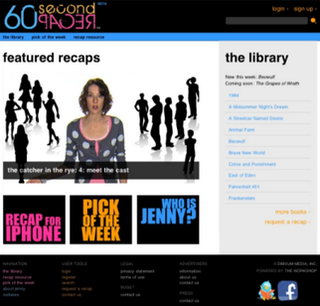 W
W60second Recap is an educational video project launched in September 2009 to provide 60-second video summaries and analysis of classic literature. The site provides one-minute video commentaries on plot, themes, characters, symbols, motifs, and other aspects of books commonly studied in secondary schools in North America.
 W
WABCya.com, L.L.C. is a website that provides educational games and activities for school-aged children. The games on the website are organized into grade levels from pre-kindergarten to Sixth grade, as well as into subject categories such as letters, numbers, and holidays. Many of the games meet standards associated with the Common Core State Standards Initiative.
 W
WBeck University was a web-based education program launched in July 2010 by American radio and television host Glenn Beck's Mercury Radio Arts. Beck University offered online classes in subjects such as religion, American history, and economics that emphasize Beck's Conservative Christian views. The classes were offered to anyone who subscribes to Beck's TheBlaze. Despite the use of the term "university" in the title, Beck University's courses are not for credit, and Beck himself never completed any college or university courses.
 W
WBloc is an online interactive platform that offers a variety of online coding bootcamps in several areas including web development, mobile development, and design. Students are paired with experienced mentors who provides support and guidance throughout the curriculum online.
 W
WAmbassadors Group, Inc. is a defunct publicly traded educational travel company based in Spokane, Washington. It was originally an operating division of Ambassadors International, Inc., but was divested into a separate corporation in 2002 to form the company under its current name. The CEO is Jeffrey Thomas, whose 2009 compensation totaled over $1.7 million.
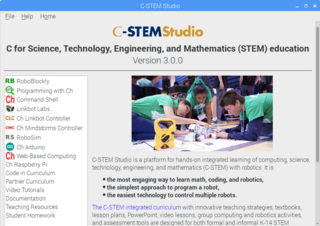 W
WC-STEM Studio is a platform for hands-on integrated learning of computing, science, technology, engineering, and mathematics (C-STEM) with robotics. It can be used to control multiple Linkbot, Lego Mindstorms NXT and EV3, Arduino boards.
 W
WCerego is an adaptive learning technology platform based on principles of neuroscience and cognitive science. Cerego's patented technology uses the scientific methods of distributed practice and the testing effect as the basis of user memory retention for content built in and available on their website.
 W
WCode.org is a non-profit organization and eponymous website led by Hadi and Ali Partovi that aims to encourage people, particularly school students in the United States, to learn computer science. The website includes free coding lessons and the initiative also targets schools in an attempt to encourage them to include more computer science classes in the curriculum. On December 9, 2013, they launched the Hour of Code nationwide to promote computer science during Computer Science Education Week through December 15, 2013.
 W
WCodecademy is an American online interactive platform that offers free coding classes in 12 different programming languages including Python, Java, Go, JavaScript, Ruby, SQL, C++, C#, Swift, and Sass, as well as markup languages HTML and CSS. The site also offers a paid "Pro" option that gives users access to personalized learning plans, quizzes, and realistic projects.
 W
WcollectSPACE is an online publication and community for space history enthusiasts featuring articles and photos about space artifacts and memorabilia, information on past, current, and upcoming space events, space history collecting resources, and links to other space-related websites. It also provides an array of message boards where registered members can discuss various aspects of space history and the space collecting hobby; buy, sell, or trade items; or pose "what if?" historical questions. Users often abbreviate the website's name as "cS," and members often refer to each other as "cSers."
 W
WCoursera Inc. is an American massive open online course provider founded in 2012 by Stanford University computer science professors Andrew Ng and Daphne Koller. Coursera works with universities and other organizations to offer online courses, certifications, and degrees in a variety of subjects. According to CNBC "more than 150 universities offered upwards of 4,000 courses through Coursera, which features over two dozen degree programs at prices that are lower than many in-person school offerings."
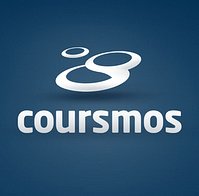 W
WCoursmos is an online micro-learning platform. It offers approximately 50,000 lessons within approximately 11,000 courses with courses broken down into smaller lessons, typically no longer than three minutes each. Launched in 2013, it has been attributed as the world's first platform that supports micro learning.
 W
WCraftsy, previously named Bluprint, is a subscription video on demand service owned by TN Marketing. The service features online courses and other forms of video content surrounding crafts, hobbies, and lifestyle topics, as well as an online store that sells craft supplies and project kits that tie into the service's video content.
 W
WCram.com is a free, web-based application for creating, studying, and sharing flashcards. Users on Cram.com have created over 68 million flashcards.
 W
WDuolingo is an American language-learning website and mobile app, as well as a digital language proficiency assessment exam. The company uses the freemium model: the app and the website are accessible without charge, although Duolingo also offers a premium service for a fee.
 W
WEdmodo is an educational technology company offering a communication, collaboration, and coaching platform to K-12 schools and teachers. The Edmodo network enables teachers to share content, distribute quizzes, assignments, and manage communication with students, colleagues, and parents. Edmodo is very teacher-centric in their design and philosophy: students and parents can only join Edmodo if invited to do so by a teacher. Teachers and students spend large amounts of time on the platform, both in and out of the classroom. Edmodo is free to use, but it also offers premium services.
 W
WedX is an American massive open online course (MOOC) provider created by Harvard and MIT. It hosts online university-level courses in a wide range of disciplines to a worldwide student body, including some courses at no charge. It also conducts research into learning based on how people use its platform. edX is a nonprofit organization and runs on the free Open edX open-source software platform.
 W
WEnglish, baby! is a social network and online curriculum for learning conversational English and slang based in Portland, Oregon. The service is used by more than 1.6 million members, making it one of the largest, most well-established and highest rated online communities of English learners and teachers. English, baby! is most popular in China, where roughly a quarter of its users are based. Other countries in which the service is popular include Turkey, Brazil, India, Egypt, the United States, and Taiwan.
 W
WeNotes is a student and teacher educational website founded in 1998 by Brad Satoris and Alexander Bloomingdale, that provides material to help students complete homework assignments and study for exams.
 W
WEpic! is an American kids subscription-based reading and learning platform. It offers access to books and videos for children ages 12 and under. The service can be used on desktop and mobile devices.
 W
WErowid, also called Erowid Center, is a 501(c)(3) non-profit educational organization that provides information about psychoactive plants and chemicals as well as activities and technologies that can produce altered states of consciousness such as meditation, lucid dreaming, transcranial magnetic stimulation, and electroceuticals.
 W
WFlashnotes is an online marketplace that allows college students to buy and sell course specific notes, study guides, flashcards and other items to help students study and/or earn money throughout their college years.
 W
WFlatiron School is an educational organization founded in 2012 by Adam Enbar and Avi Flombaum. The organization is based in New York City and teaches software engineering, computer programming, data science, and cybersecurity analytics. In 2017, the company was sued for making false statements about the earning potential of its graduates. It was acquired by WeWork in 2017 and sold to Carrick Capital Partners in 2020. It was ranked the best coding bootcamp by Career Karma in 2020.
 W
WFlorida Virtual School (FLVS) was founded in 1997 as the first statewide Internet-based public high school in the United States. In 2000, FLVS was established as an independent educational entity by the Florida Legislature. Recognized as its own district within the state, it provides online instruction to Florida students in Kindergarten through 12th grade. According to its website, "FLVS is part of the Florida public education system and serves students in all 67 Florida districts. FLVS also serves students, schools, and districts around the nation through tuition-based instruction, curriculum provision, and training." As a public school, its funding is tied directly to student performance.
 W
WfreeCodeCamp is a non-profit organization that consists of an interactive learning web platform, an online community forum, chat rooms, online publications and local organizations that intend to make learning web development accessible to anyone. Beginning with tutorials that introduce students to HTML, CSS and JavaScript, students progress to project assignments that they complete either alone or in pairs. Upon completion of all project tasks, students are partnered with other nonprofits to build web applications, giving the students practical development experience.
 W
WGreatSchools is a United States national nonprofit organization that provides information about PK-12 schools and education. The website provides ratings and comparison tools based on test scores and other factors for schools in the U.S. As of July 2017, the GreatSchools database contains information for more than 138,000 public, private, and charter schools in the United States.
 W
WHowcast is an educational technology website that provides instructional short-form how-to video and content that combines practical information with various filmmaking techniques such as humor, claymation and animation. The how-to content is created in-house, through its Emerging Filmmakers Program, media content partners and individual contributors . Its Emerging Filmmakers Program allows emerging filmmakers to apply to make videos for Howcast.com and are compensated by receiving $50 a video and 50% of the advertising revenue generated from videos that generate over 40,000 views.
 W
Wkadenze.com, operated by Kadenze, Inc. ("Kadenze"), is a for-profit massive open online course (MOOC) provider that offers courses geared toward art, music, and creative technology, fields which are falling behind other fields such as computer science in terms of number of courses offered in the MOOC space. It was launched on June 16, 2015 with 18 academic partners including: Stanford University, Princeton University, UCLA, California Institute of the Arts, School of Art Institute of Chicago, Maryland Institute College of Art, Goldsmiths College, MassArt, Seoul Institute of the Arts, Paris College of Art, National University of Singapore, Cornish College of Art, University of Texas at Austin, Rhode Island School of Design, Pacific Northwest College of Art, Arizona State University, Columbus College of Art and Design, and School of Visual Arts.
 W
WKnowing Neurons is a neuroscience education website created in 2012 by PhD graduate students at the University of Southern California (USC) and the University of California, Los Angeles (UCLA). The website features regular content focused on elucidating fundamental neuroscience concepts, new research, and current hypotheses. Special series featured on Knowing Neurons include the weekly 52 Brain Facts infographics than ran from 2015 to 2016 and the series Weird Animal Brains on comparative neurobiology that debuted in 2016. Most content on Knowing Neurons is in the form of articles, infographics, book reviews, and interviews with prominent neuroscientists. Knowing Neurons has also produced several YouTube videos, including interviews with people with synesthesia and an animated video This Is Your Brain on Music narrated by actor Bob Turton.
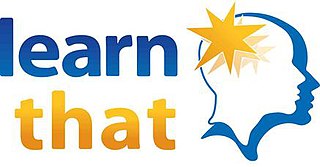 W
WLearnThat Foundation is an American 501(c)3 nonprofit organization that develops and manages an online vocabulary and spelling program along with a free multimedia learners' dictionary, Open Dictionary of English (ODE). The foundation was founded in February 2004 under the name eSpindle Learning. In August 2010, the name was changed to LearnThat Foundation, and its domain was moved to www.LearnThat.org. The program is branded as LearnThatWord.
 W
WLissaExplains.com is a Web site created by Alyssa "Lissa" Daniels, a girl from Orlando, Florida, to teach people, especially children, how to make their own Web sites. She was 11 years old when she set up the first site in 1997, and is currently a university junior in Florida. Her site has taught many people how to create a Web site by writing their own HTML without the use of Web page creators. The web site includes tutorials and an internet forum.
 W
WYanka Industries, Inc., doing business as MasterClass, is an American online education subscription platform on which students can access tutorials and lectures pre-recorded by experts in various fields.
 W
WMIT OpenCourseWare is an initiative of the Massachusetts Institute of Technology (MIT) to publish all of the educational materials from its undergraduate- and graduate-level courses online, freely and openly available to anyone, anywhere. The project was announced on April 4, 2001, and uses Creative Commons Attribution-NonCommercial-ShareAlike license. The program was originally funded by the William and Flora Hewlett Foundation, the Andrew W. Mellon Foundation, and MIT. Currently, MIT OpenCourseWare is supported by MIT, corporate underwriting, major gifts, and donations from site visitors. The initiative inspired a number of other institutions to make their course materials available as open educational resources.
 W
WNASA Space Place is an educational website about space and Earth science targeting upper-elementary aged children. Launched in 1998, it was the first NASA website to create content about multiple missions directly for children. It has its own url, and it also serves as the kids’ portion of the NASA Science Mission Directorate website.
 W
WThe Open Dictionary of English is a multimedia learners' dictionary, published by 501(c)3 nonprofit organization LearnThat Foundation. It is fully integrated with LearnThatWord, the vocabulary and spelling tutoring program by LearnThat Foundation, and can also be used as a standalone dictionary.
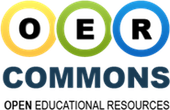 W
WOER Commons is a freely accessible online library that allows teachers and others to search and discover open educational resources (OER) and other freely available instructional materials.
 W
WThinkQuest was an educational website, created 1996 and intended for primary and secondary schools. Beginning 2002 it was owned by the Oracle Education Foundation and was known as Oracle ThinkQuest.
 W
WPeer 2 Peer University (P2PU) is a nonprofit online open learning community which allows users to organize and participate in courses and study groups to learn about specific topics. Peer 2 Peer University was started in 2009 with funding from the Hewlett Foundation and the Shuttleworth Foundation, with its first of courses in September of that year. An example of the "edupunk" approach to education, P2PU charges no tuition and courses are not accredited. However, some courses in "The School of Webcraft" provide the opportunity for recognition of achievements through the Open Badges project.
 W
WQuizlet is an American online study application that allows students to study various topics via learning tools and games. It was founded by Andrew Sutherland in October 2005 and released to the public in January 2007.
 W
WResearchChannel was an American educational cable television network operated by a consortium of universities, foundations, government agencies, corporations, and learned societies. It began broadcasting in 1996 and discontinued operations in 2010.
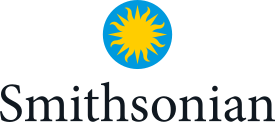 W
WSmithsonian Libraries (SIL), formerly known as Smithsonian Institution Libraries, is a library system comprising 20 branch libraries serving the various Smithsonian Institution museums and research centers, as well as central support services which include a Book Conservation Laboratory and an Imaging Center. The Libraries serve Smithsonian Institution staff as well as the scholarly community and general public with information and reference support. Its collections number over 1.5 million volumes including 40,000 rare books and 2,000 manuscripts. The Libraries also holds the United States' largest trade literature collection, which includes over 300,000 commercial catalogs dating from the early nineteenth century and representing more than 30,000 companies.
 W
WStarfall is a children's website that teaches basic English reading and writing skills. The main demographic is preschoolers, and kindergarteners. It teaches children how to read by using games and phonics. Methods used by the website are based on the research of G. Reid Lyon from the National Institutes of Health and Edward J. Kame'enui from the University of Oregon. Established in 2002, the website is free to use and does not use advertising to generate revenue. The cost of running it is instead covered by money from Blue Mountain Arts, as well as the money made from its workbook printouts.
 W
WStoryBots is an American children's educational media franchise best known for the Netflix series Ask the StoryBots. The StoryBots library includes educational TV series, books, videos, music, games and classroom activities designed to make foundational learning fun and encourage intellectual curiosity in children ages 3-to-8. Subjects cover a wide range of themes and feature a cast of characters called the StoryBots, who are tiny, colorful robotic creatures who have eyes on top of their head, eyebrows, rectangular bodies, have expressional semi-circles for heads that move with every syllable, long lines for limbs, circles for feet and have pincer-like appendages for hands that are either depicted as magnet shaped, half a square with a hole going out to make two fingers, simple lines, crab pincers or 9 shaped that live within computers, tablets and phones and help humans answer questions.
 W
WStudy Notes is an online learning tool created by high school junior Feross Aboukhadijeh in El Dorado Hills, California. It was released to the public in March 2007. By September 2011, Study Notes was receiving 10,000 page views per day. As of September 2015, Study Notes has served over 43 million users. The site currently operates out of Stanford, CA.
 W
WStudyhall is an online education startup based in Washington, DC, United States, and founded by Cornell and Washington University in Saint Louis School of Law graduate Ross Blankenship in 2012. The company is a peer-to-peer learning platform that seeks to change higher education by providing a virtual space in which students can collaborate.
 W
WTeacherTube is a video sharing website. It is designed to allow those in the educational industry, particularly teachers, to share educational resources such as video, audio, documents, photos, groups and blogs. The site contains a mixture of classroom teaching resources and others designed for teacher training. A number of students have also uploaded videos that they have made as part of K-12 and college courses. As of July 2008, the website contained over 26,000 videos. In October 2010, TeacherTube had over a million members and over 400,000 educational videos. It has found favor with educators from institutions where YouTube content is blocked by content filtering systems.
 W
WFounded in 2010 and launched in 2011, Teaching Channel is a multi-platform service delivering professional development videos for teachers over the Internet. In addition to showcasing inspiring teachers in videos, Teaching Channel also hosts a community for educators to share ideas, best practices and enhance their knowledge.
 W
WTechChange is a US social enterprise which provides courses on the use of technology in addressing social and global challenges. Their e-learning platform "has been used by more than 600 students from more than 70 countries." It is a registered benefit corporation based in Washington, DC and was founded in the summer of 2010. The Economist dubbed TechChange as ”the Geeks for Good”.
 W
WTED Conferences LLC is an American media organization that posts talks online for free distribution under the slogan "ideas worth spreading". TED was conceived by Richard Saul Wurman, who co-founded it with Harry Marks in February 1984 as a conference; it has been held annually since 1990. TED's early emphasis was on technology and design, consistent with its Silicon Valley origins. It has since broadened its perspective to include talks on many scientific, cultural, political, humanitarian and academic topics. It is curated by Chris Anderson, a British-American businessman, through the non-profit TED Foundation since July 1, 2019.
 W
WTynker is an educational programming platform aimed at teaching children how to make games and programs, where a user visually drag blocks of code and snap them together. The visual design and principles are based on the free Scratch. Tynker is based on HTML5 and JavaScript, and can be used in the browser without plugins, as well as on tablets and smartphones. Another difference is that Scratch is a free open source project, while Tynker is a commercial product, aimed at selling courses. Tynker offers self-paced online courses for children to learn coding at home, as well as an engaging programming curriculum for schools and camps. It makes it easier for kids to learn coding as it teaches kids coding through creating games like Minecraft, Hour of Code etc.
 W
WUdacity, Inc. is an American for-profit educational organization founded by Sebastian Thrun, David Stavens, and Mike Sokolsky offering massive open online courses.
 W
WUdemy, Inc. is an American massive open online course (MOOC) provider aimed at professional adults and students. It was founded in May 2010 by Eren Bali, Gagan Biyani, and Oktay Caglar.
 W
WUniversity of the People (UoPeople) is a private non-profit, distance education university with its offices in Pasadena, California and in Israel.
 W
WWall Street Survivor is an educational website that teaches people the basics of finances. It uses gamification to teach concepts of the stock market, investing, and general financial planning. The website has been seen in publications which include Business Insider, TechCrunch, The Globe and Mail, and Forbes.
 W
WWhy U, Inc. is a non-profit 501(c)(3) educational organization funded by the Goldman Charitable Foundation. Why U is dedicated to exploration through the use of digital media, of new education paradigms for the STEM subjects: Science, Technology, Engineering, and Mathematics. Why U's goal is to remove barriers to learning in the STEM subjects, and increase the public's depth of knowledge of STEM.
 W
WWhyville is an educational Internet site geared towards children from ages 8–14+ founded and managed by Numedeon, Inc. Whyville engages its users in learning about a broad range of topics, including science, business, art and geography. Whyville's users (Whyvillians) engage in virtual world simulation based games and role play sponsored by a wide range of governmental, non-profit, and corporate entities. In 2009, the website had a registered base of more than 7 million users.
 W
WWorldQuant University (WQU) is an American online university. It has 10 courses, attended by 1500+ students from 90 countries. It is non-profit tuition-free. It is licensed by the Board of Regents of the State of Louisiana.